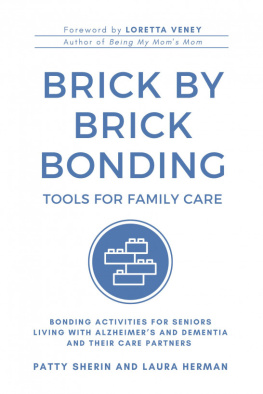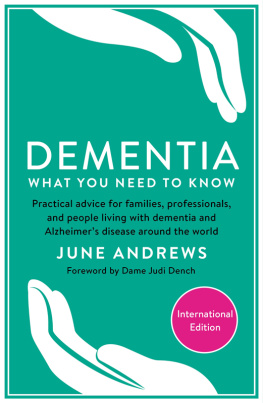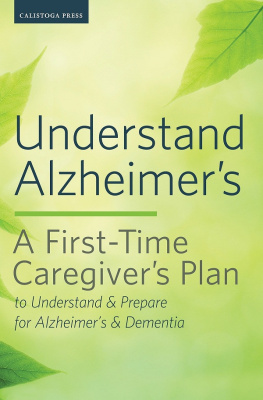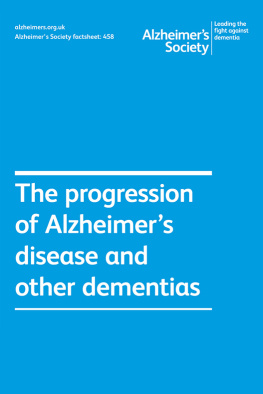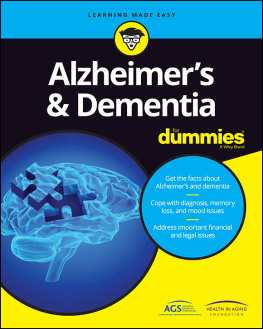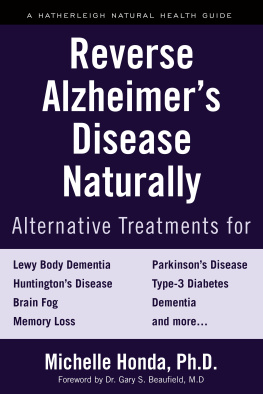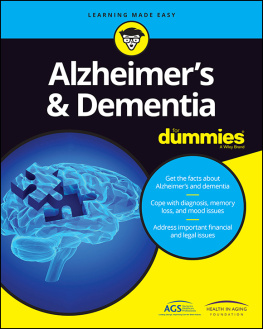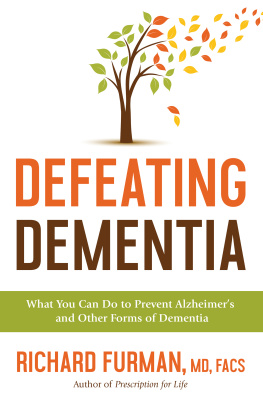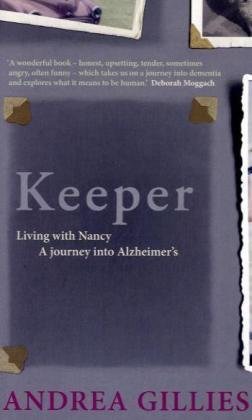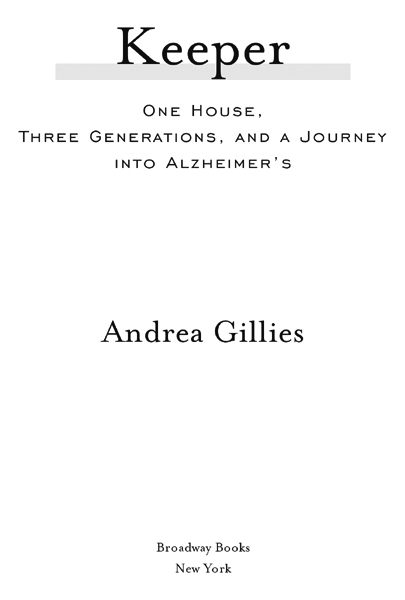To C and the children,
And with love and gratitude to my family and friends
Contents
I amyet what I am, none cares or knows;
My friends forsake me like a memory lost:
I am the self-consumer of my woes:
They rise and vanish in oblivions host,
Like shadows in loves frenzied stifled throes:
And yet I am, and livelike vapours tossed
Into the nothingness of scorn and noise,
Into the living sea of wakeful dreams,
Where there is neither sense of life or joys,
But the vast shipwreck of my lifes esteems;
Even the dearest, that I love the best
Are strangenay, rather stranger than the rest.
J OHN C LARE (C. 1840)
Introduction
You have to begin to lose your memory, if only in bits and pieces, to realize that memory is what makes our lives. Life without memory is no life at all. Our memory is our coherence, our reason, our feeling, even our action. Without it, we are nothing.
L UIS B UUEL
It is singular how soon we lose the impression of what ceases to be constantly before us. A year impairs, a luster obliterates. There is little distinct left without an effort of memory, then indeed the lights are rekindled for a momentbut who can be sure that the Imagination is not the torch-bearer?
L ORD B YRON
T HE PROCESS OF WRITING THIS BOOK, THE PHYSICAL act of putting it together from diaries, scribbled notes, books about the mind, and concentrated bouts of introspection, has proven an illuminating exercise for me, demonstrating just what it is that dementia takes away. (Answer: everything; every last thing we reassure ourselves that nothing could take away from us.) The way the brain works, the supercomputer folded modestly into every human head, marshaling its forces, making connections, prompting and synthesizing, is dazzling and extraordinary and yet seems every day perfectly unexceptional and ordinary to us. Theres nothing we take more for granted. In recording the decline of somebody with dementia, and seeing her preoccupations grow narrower and narrower, and her intellectual pathways block off, Ive found myself preoccupied with unexpected things, more and wider things, my mind disappearing down all kinds of unforeseen alleys, which has been exhilarating but also poignant. Im left feeling a profound gratitude to the life of the mind, how associative it is and how rich, in its leading on from one thing to another, into that whole interior landscape of yoked-together and often incongruous thoughts that adds up to a self. This book has turned out to be as much about the unraveling of a caregiver as it is about the person cared for, but its starting point was wanting to write about Alzheimers and about life with an Alzheimers sufferer, my mother-in-law, Nancy.
We spent many years looking after Nancy at one remove from us, a responsibility made more stressful by distance, and then at closer rangein a big Victorian house in a remote part of Scotland, with Nancy and her disabled husband, Morris, living with us and our three children. The house was not an ordinary one and, in a way I didnt anticipate, became another character in the story. It was an imposing, drafty mansion on a wild, near-treeless headland. We moved there specifically to attempt an extended family; when that failed, we had little choice but to leave. The official gloss put upon this exit is of the phases of life sort: job done, time to go. The private verdict is soaked marrow-deep in defeat.
Im aware that in many ways this is a story about privilege. We could afford (could convince the bank we could afford) the big house and the part-time help, and when push came to shove (and it did, literally), my in-laws could come up with the fees for a good nursing home. But there are monetary consequences to caregiving, above and beyond the obvious weekly bills, and there has been a real financial hangover that were still working through, brought on by months and years of having no choice but to put work second.
Well, so what, you may be thinking. You took in your husbands parents. Boo-hoo. Big deal. Across other, more populous continents, three-generation households are the norm, after all (the Asian three-generational photograph is lodged reprovingly in my brain), and they will likely become more commonplace here, as the care crisis bites harder. Its pretty clear that it will bite. The world seems to be in the grip of a dementia epidemic. Here in Britain, there are 820,000 people whove been diagnosed with dementia, two-thirds of them women, and the figure is rising sharply. In the United States, its more than ten times that number. Of these, according to the Alzheimers Association, 5.3 million have Alzheimers disease. There are estimated to be more than 35 million dementia sufferers across the globe, with over 65 million forecast for 2030 and more than 115 million for 2050: the figures near doubling every twenty years. Thats why the phrase dementia time bomb is beginning to be used. The devastating extra sting of dementia is that, unlike heart disease and cancer, it doesnt shorten life. Its a cruelly lengthy business. The changes in the brain can begin twenty years before a formal diagnosis, and the average life expectancy afterward is eight years.
Alzheimers disease is only one of many varieties of dementia, though by far the commonest. Over 60 percent of diagnosed dementia sufferers have Alzheimers disease. Back in 2002, BBC News reported that more than 40 percent of UK home caregivers of someone with Alzheimers had been forced to give up work in order to look after the person. In the United States, 10 million people act as caregivers to someone with dementia and millions more offer support. About the same percentage of American caregivers are not employed, and two-thirds of those who can manage to hold down a job report major disruption to the workweek. I quote these statistics as a roundabout way of answering my own question: Why write this book at all? There were several reasons. One of these was to share in my own revelation, hard-earned, that Alzheimers isnt just about memory loss; that memory loss isnt just about memory loss, but leads to disintegration. I wanted also to kick the system ineffectually in the shins; to give a glimpse into the dementia abyss; to show that for every client in the statistics there are one, two, four, six others (aka the family) whose lives are blighted in addition; in short, to give a little insight into the reality that ensues from the apparently noble idea (the noble, and for the countrys financial bottom line, far preferable idea) that the elderly ill should stay at home whenever possible.
Question: Do governments understand just how dehumanizing Alzheimers is? (A rhetorical question. Answer: no, or they wouldnt withhold good drug treatments or limit research programs on grounds of cost.) Question: Does anybody who hasnt been through it understand just how dehumanizing caregiving can be? (A rhetorical question. Answer: no, or there would be proper nursing home provision and it would be free.) As things stand in the United Kingdom, dementia patients in nursing homes, unlike cancer patients in hospitals, are regarded as social care clients and charged hotel rates, and if they have savings and houses must give them up to pay the bills. We British may regard ourselves as two steps ahead of the United States in the matter of universal rights to health care, but when it comes to dementia, the two systems are very alike. Medicaid will step in and pay for residence in a nursing home only if the ill persons own assets have dwindled away almost to nothing, and its pretty much an identical situation in the United Kingdom. Once the money runs out, the ill persons house is likely to be sold to pay for care, unless a spouse or dependent is still living in it. Even if American houses can be placed out of risk in the short term, certainly they are at risk after the owner with dementia has died, via


